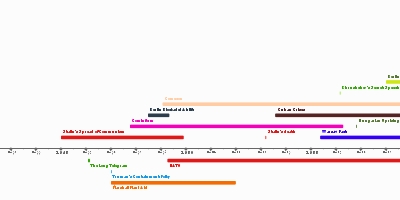1970s Detente (1 gen 1970 anni – 24 feb 1979 anni)
Descrizione:
Background• After the humiliation of the Vietnam war, the USA mad an effort to improve relations further with the USSR and China.
Signs of easing relationship
• The arms race was expensive: both sides knew that money for nuclear weapons could be spent better elsewhere, especially in the USSR.
• President Nixon knew Vietnam conflict had to cease due to increasing domestic distaste – as well as making the US more isolationist. The USA would leave Vietnam in 1974.
• The USSR and China had a souring relationship (Sino-Soviet Split). His meant the USA found it easier to establish relations with the PRC and Nixon would visit in 1972. With the USA close with China – the USSR sought to improve relations with the US.
• In 1972, Nixon would meet with Brezhnev in Moscow. During this visit the Strategic Arms Limitation Talks took place – leading to SALT 1.
1972
- SALT 1
• Strategic Arms Limitation Treaty 1.
• Nixon and Brezhnev, in Moscow.
• Importance:
• Slowed down arms race.
• Showed improvement in relations.
• Would lead to further improvements like the Helsinki Conference and SALT 2.
• Limitations:
• Did not cover intermediate-range nuclear weapons.
• Slowed down the arms race yet both sides still had enough nuclear weapons to destroy the planet.
• Agreement between USSR and USA to limit the number of nuclear weapons they had.
USA to around 1000 ICBMs, and the USSR to around 1500 ICBMs.
USA to 41 Nuclear Subs, USSR to 42 Nuclear Subs.
Can scrap old weapons and make new ones.
Five-year delay in building more missiles.
1975
- Helsinki Accords / Agreements
• Helsinki conference focused on security and co-operation in Europe. The agreements made at said conference are the Helsinki Accords.
• Signed by USA, USSR and nearly all European nations.
• Current borders of European countries could not be changed or violated and no country could interfere in the affairs of another country – with all disputes solved peacefully.
• Promoted trade between East and west – USA purchases Soviet oil and the Soviets purchased US grain; also, there would be scientific co-operation.
• Respect human rights such as freedom of speech and free movement.
• NOT ABOUT WEAPONS.
• Problems:
• Soviet Union continued to apply Brezhnev Doctrine.
• Eastern Bloc countries did not uphold the human rights agreement.
- Apollo-Soyuz Mission
• Joint mission between USA and USSR – their crafts docked in space and astronauts shook hands.
• July.
• Significant as it was the first time the USA and USSR had cooperated in space instead of competing.
• Slowed down space race.
1979
- SALT 2
• Second round of talks to limit the use of multi-warhead missiles.
• June.
• In Vienna, between Carter and Brezhnev.
• Limitations:
• Did not reduce overall numbers each nation had.
• Reactions:
• Some US politicians believed it gave too much to the USSR.
• West German politicians believed it made the USA less likely to use nuclear weapons to defend West Germany.
• Agreements:
• Further reductions in nuclear weapons until 1985, limiting number of long-range missiles.
• USA and USSR would have equal limit of 2,400 missile launchers and strategic bombs.
• New types of ICBMs were banned from testing or deployment.
• Ultimately, the US senate would refuse to sign SALT 2 after the Soviet invasion of Afghanistan.
Aggiunto al nastro di tempo:
Data:
1 gen 1970 anni
24 feb 1979 anni
~ 9 years
